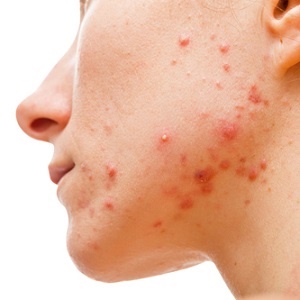
Acne commonly erupts in areas of maximal sebaceous gland activity: the face, neck, chest, shoulders, back, and upper arms. Acne is rarely misdiagnosed. It is easily recognizable by both the patient and the practitioner. The management of acne, however, is frequently complex.
Despite the clinical similarities and occasional overlapping of adolescent and post adolescent acne, the pathogenesis and treatment of each are often different.
Acne-like disorders, such as neonatal acne, drug induced acne, rosacea, and other so-called acne form conditions, are also considered separate entities because of differences in pathogenesis and treatment.
CLASSIFICATION OF ACNE:
Adolescence acne (Acne Vulgaris). Preteen acne and adolescent acne (which may persist into adulthood).
Post adolescent Acne
Female adult-onset acne.
Female adult-onset acne concurrent with adolescent acne that has persisted into adulthood.
Postmenopausal acne.
Endocrinopathic acne.
Male adult-onset acne (rare).
In addition, the following are acne disorders:
Folliculitis.
Hidradenitis suppurativa.
Pseudofolliculitis barbae.
Acne keloidalis.
Neonatal acne.
Rosacea.
Perioral dermatitis.
Drug-induced acne.
Physically induced and occupational acne.
INFLAMMATORY LESIONS
Papules: Superficial red bumps ("zits") that may have crusted. Scabbed surfaces caused by picking or squeezing.
Pustules: Superficial raised lesions containing purulent material, generally found in the company of papules.
Nodules: Large, deep papules or pustules.
�"Cysts:" Acne "cysts" are not really cysts. True cysts are neoplasms that have an epithelial lining. Acne "cysts" do not have an epithelial lining; they are composed of poorly organized, variously shaped and blackhead or whitehead. Alternatively, the microcomedo may become an inflammatory lesion, such as a papule or pustule. The development of inflammatory lesions is theoretically as follows: Androgenic hormones stimulate sebaceous glands to increase in size and function and thus to produce more sebum (oil). The skin becomes oilier and the microcomedo becomes more hospitable to the anaerobe Propionibacterium acnes.
No inflammatory lesions:
The combination of open and closed comedones, as seen here, is most common in younger patients.
Sized conglomerations are inflammatory material.
Macules: The remains of formerly palpable inflammatory lesions that are in the process of healing from therapy or spontaneous resolution. They are flat
COMEDONAL (NONINFLAMMATORY) LESIONS
A comedo is a collection of sebum and keratin that forms within follicular ostia (pores).
Open comedones (blackheads) have large ostia that are black not from dirt but from melanin.
Closed comedones (whiteheads) have small ostia. A combination of both inflammatory and comedonal acne is most commonly seen in younger patients.
Read our products review: acne-stop.com



How to Find Just the Right Diet for Acne
When you're suffering from acne, the first thing on your mind is, "How am I going to get rid of my acne?"� You might have tried prescription medications.� You might be taking oral contraceptives, hormone replacement pills, or even Accutane-style drugs.� While these acne products often do help get rid of acne, none of them last forever.� You'll need to keep taking them month after month, pouring dollar after dollar into prescription drugs that might very well be wreaking havoc on the rest of your body.� If this describes your situation, you need to look into a diet for acne.
Read More
Superfoods: Super Strategies for Stamping Out Acne
Most people with acne attempt to treat their irritated skin withexternal face washes, soaps, lotions and treatments. However, the bestway to treat acne is by changing your diet and getting rid ofacne-causing ingredients such as fried foods.
Read More
Tips To Cure Baby Acne
Baby acne is not uncommon among the new born. Its other name is infantile acne. Though cheek is the favorite place of baby acne, it manifests over chin and forehead as well�
Read More
Triggers and Various Treatments of Acne
Although common, acne is a serious skin disorder that affects not only the skin but also self confidence. The impact of acne is far more widespread, more than what we see on the skin. You may have asked this question before. "Why am I still breaking out?" This article will help you avoid some of the causes and minimize the recurring of acne.
Read More
This Article was written by : Jojo Michelle, Discuss about Health Articles, it was published at August 29, 2008 and was updated at
Comments
Post a Comment